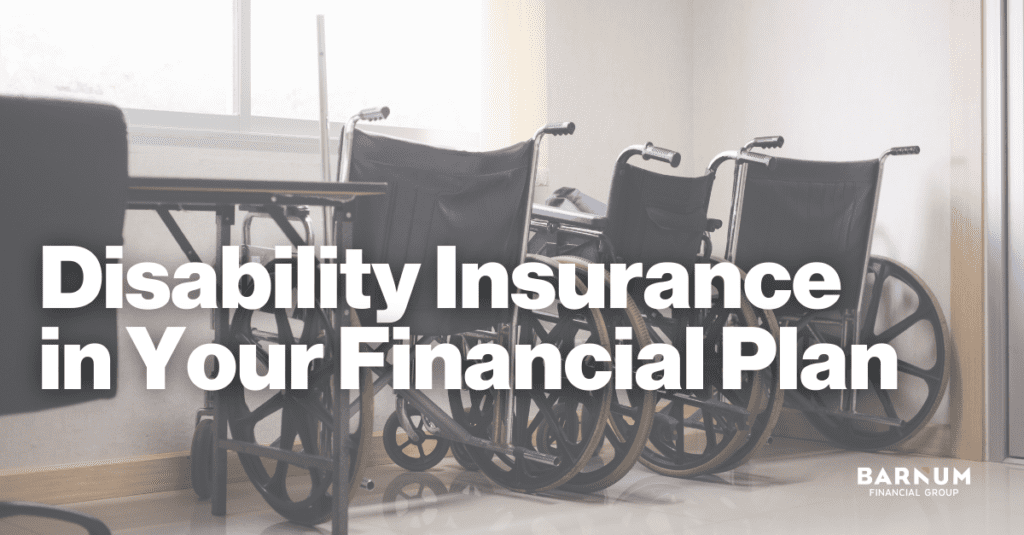Have you talked with a financial professional about disability insurance coverage? It may benefit to seek out answers to questions you may not have thought to ask yet. this article is a great starting off point for that conversation.

Save your money. Stick to a budget. Invest in a 401K. Plan for your children’s education. Prepare for retirement. As we all work in our various career fields, these are the phrases we hear consistently. Building a financial plan is essential in preparing for your future and the future of your loved ones, but where does Disability Insurance (DI) fit into those plans? With the month of May being Disability Insurance Awareness Month, it’s the perfect time to evaluate your financial plan and see if disability insurance is right for you.
For most people, disability insurance is a box they check when they’re hired by an employer as they opt for the basic group plan. But serious consideration should be given to obtaining your own individual disability insurance plan. You get what you pay for, but it’s very important to know what your plan covers at work, features included, and to know if you are also being covered if you are heavily compensated in bonus/commission. With life insurance, the choice is a simple one. When we pass away, we all want to make sure our loved ones are taken care of and that’s why life insurance makes sense. But DI protects us from financial losses throughout our life, whether its an accident or an illness, 43% of all people aged 40 will have a long-term disability by the age of 65.[1]
2 Types of Coverage
There are two different types of Disability Insurance Coverage:
- STD (Short-Term Disability) Policy
- Waiting period of 0-30 days.
- Maximum benefit period of no longer than 2 years
- LTD (Long-Term Disability) Policy
- Waiting period of several months
- Maximum benefit period of a few years to retirement age (65, 67, 70)
- 90 days is the typical waiting period for a long-term disability that can stack onto a short-term policy
There are many reasons to include disability insurance in your financial plan, but none are more important than this: It’s all about protecting your income. 88% of disability insurance claims are because of illness.[2] Obviously, we cannot predict our health as we grow older. We also cannot predict or plan to have a car accident, but we don’t think twice about obtaining car insurance. If you became too sick or hurt to work, why are we not insuring your most valuable asset? Your income.
A plastic surgeon who develops Dupuytren’s Disease, which causes the fingers to be pulled towards the palm, is unable to operate. A teacher with anxiety develops consistent migraines that impede their ability to instruct their students. A bus driver is diagnosed with cancer, which keeps them out of their job for several months. With disability insurance coverage, these people could protect their lost income from being unable to perform their jobs.
Any-Occ and Own-Occ
Another facet of disability insurance is the difference between Any-Occupation (Any-Occ) and Own Occupation (Own-Occ) policies. With Any-Occ, a person only qualifies for disability insurance payments if their disability prevents them from performing any occupation. Own-Occ deals with disabilities that prevent a person from performing their specific job. Like the surgeon, with a disabled hand, who cannot perform operations. They would be able to take a teaching position at a university. Disability insurance will pay the surgeon for being unable to perform their own job, while still mainlining employment in another field of study. There are also features to mitigate the risk of a drop in income if you were to become partially disabled and had a loss of time and duties which would result in a loss of income.
As mentioned above, your employer probably offers you group disability insurance coverage and while that’s a form of protection, it’s not your best form. Obtaining your own, individual disability coverage, subsidizes the gap in coverage that any group plan with offer. It also provides you with other incentives. An individual plan stays with you throughout your life. It will follow you if you happen to obtain employment at another company. Disability insurance benefits are also tax-free since you purchased your individual plan with after-tax dollars as opposed to group plans, which are taxable, since your payments are taken out of your gross wages by your employer.
If you’re thinking about disability insurance or this article has brought up more questions on the subject for you, the financial planners at Barnum Financial Group can easily walk you through those answers and guide you in the right direction if looking to purchase an individual disability insurance coverage plan.
Remember. Disability Insurance is about protecting your income.
[1] https://www.iii.org/main-responsive/disability-income
[2] https://disabilitycanhappen.org/disability-statistic/



